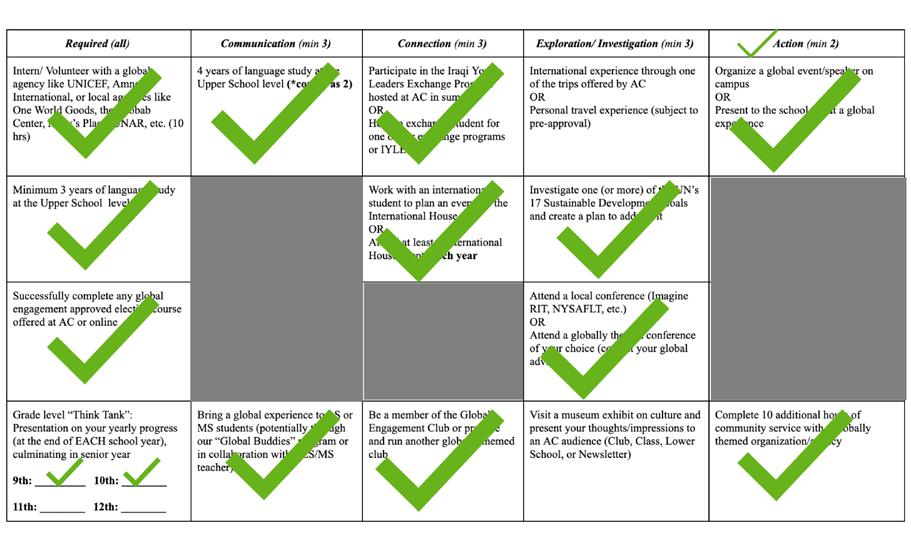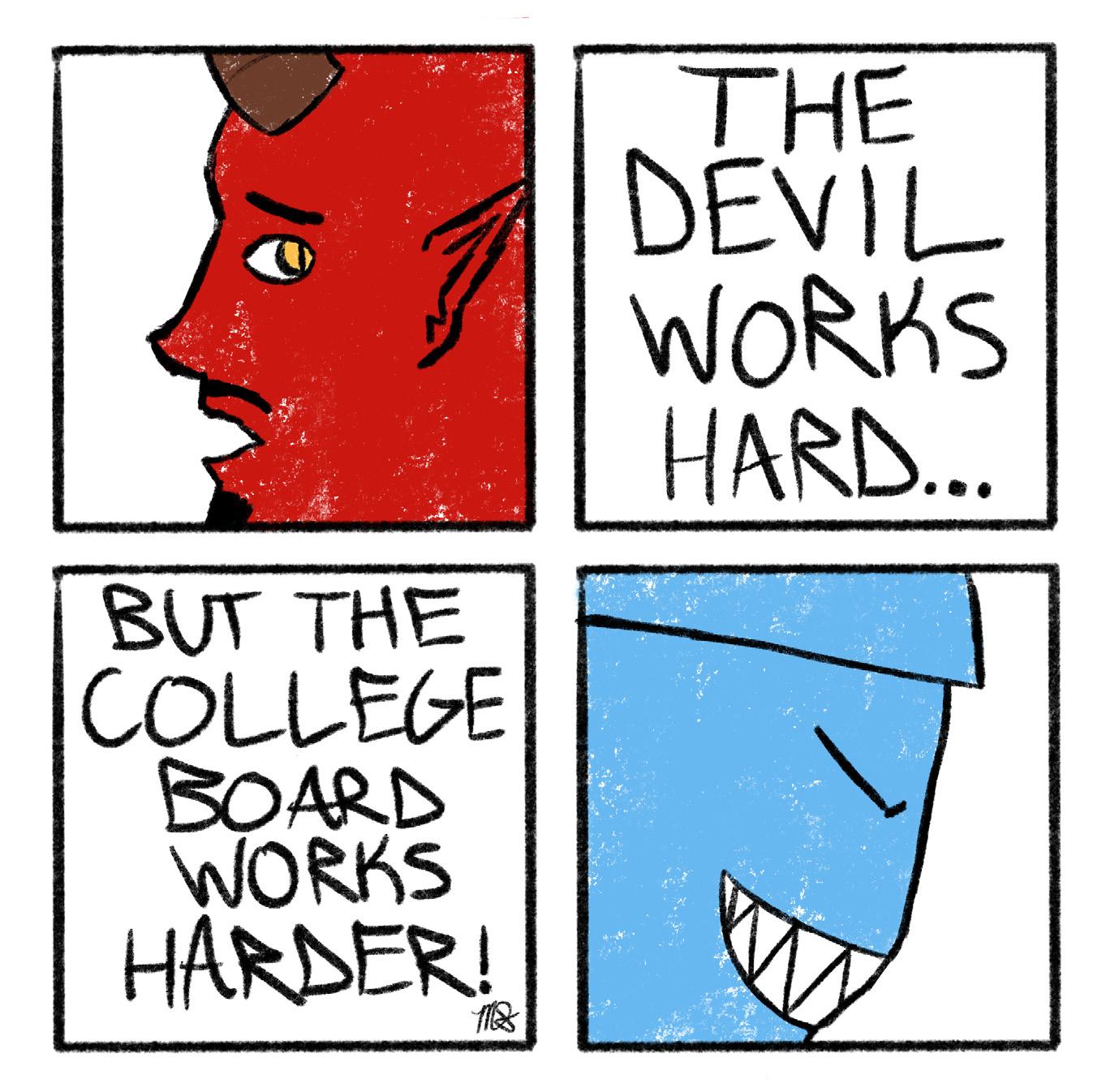
6 minute read
THE DISCONNECTION BETWEEN STUDENTS AND TEACHERS
JAMES THORNBURG
I have two diplomas I’m currently working on, an entrepreneurship diploma and a global diploma. I started my global diploma in 9th grade but didn’t have the chance to start an entrepreneurship diploma until 10th grade.
Advertisement
I intend to finish my global diploma this year with an international trip to Norway. But I didn’t finish these overnight and I didn’t just decide to start working on these diplomas on a whim, so why did I decide to pursue these diplomas and why should you pursue one?
Falling Outside Of The Curriculum
No school can teach all the classes that students are interested in, there simply aren’t enough teachers or time during the school day to accomplish that. Diploma work allows you to pursue classes and interests that may fall outside of the curriculum and still get credit for them.
For instance, this school has no ASL or Norwegian classes, or languages that I am interested in, so I have been taking classes and teaching myself Norwegian. I took one year of ASL from a deaf teacher on an online platform. Using my entrepreneurship diploma I can get credit for both my ASL and Norwegian study.
Community Work
Diploma work allows you to connect with more people. I have connected with many people through Best Buddies, which I wouldn’t have been able to do without the flexibility of an entrepreneurship diploma. I have also been able to volunteer due to my entrepreneurship diploma.
In 10th grade, I volunteered with Luv Micheal. Luv Micheal is an autism acceptance organization run out of New York that provides paying jobs for autistic people. These Jobs allow them to preserve social relationships, afford to pay for basic needs, and preserve their sense of purpose. I volunteered about 10 hours for one week and during that time helped to fundraise for the organization.
I talked to many people in an attempt to fundraise and found that they had connections to this kind of organization that I had never heard of before. Doing volunteer work allowed me to connect with my community.
CHRIS SMOKER
WHAT IS GOING ON?
I am a senior at Allendale Columbia, as well as the oldest member of the current student body. I take great pride in the communication skills I have built with faculty, and my peers. I have seen people come and go, through thick and thin. I have observed that there are less respectful conversations, and a lack of opportunity for students to speak freely against a mainstream idea, even in a structured environment with a teacher. After attending Mr. Hunt’s Democracy and Discourse class, I can say that it is crucial to any form of discussion that there must be risk, and significance. Without trust between teachers and students, the political climate at AC has become terrifying. I have personally played “devil’s advocate” dozens of times when I felt that I had been in a constructive rather than a constraining environment. I have grown into an informed, respectful, and politically rounded individual because of the trust given to me. Unfortunately, the lack of trust between students and teachers has caused both parties to spread offensive comments, to be disrespectful, and display passive aggressiveness, things that hinder civil discourse and trust within the community.
I believe we should not sacrifice one party over the other. Everybody’s feelings are of equal value, regardless of their position of power, their race, or their political affiliation. There have been many notable cases of teachers publicly shaming students or outright accusing them of being this or that, always in front of other students. I believe opinions belong in schools, but only if they are shared respectfully, which applies not only to students but teachers as well. Occurrences have been reported that a select few teachers call or insinuate a student an offensive title such as, racist, homophobic, or bigoted simply from a miscommunication, or due to a personal stance on an issue. Conducting conversations like that completely shut down the opportunities to learn and grow, something I believe we all value in the community. After speaking to many students, it has been reported that public shaming is the most common form of discipline by teachers when “controversial” topics are mentioned. Perhaps there needs to be some form of evaluation on what types of conversations that students and teachers can handle in the classroom. In addition to students fearing repercussions, many teachers are unprofessional, bad mouthing each other in front of students even. How can students feel safe if faculty are insulting their coworkers and ignoring how students may feel hearing this? Hearing negative comments about the school and why they want to leave is certainly not encouraging for students to hear.
The topics discussed at school can vary, as the news always has an effect in and out of the classroom. After interviewing and discussing this issue with every class, I can firmly say that student-teacher relationships as a whole have deteriorated, especially if a student is not left leaning. Silencing a small group of individuals because of their political affiliation should not be welcomed in the AC community. For example, silencing Asian/Asian-American students just for being Asian is inappropriate and sounds ridiculous. I believe that minority students have the right to not feel marginalized, and everyone else has the right to not feel oppressed for not being a minority. Everyone is equal; nobody’s feelings should be cared about more than others, as we are all students and members of the AC community. We cannot prioritize one group of people over another; that is favoritism, and is unfair to everyone. Either we protect everyone or no one, because unintentional resentment begins to grow from unheard voices. A select few teachers this year have commonly directed negative feelings towards students, such as raising their voice, demanding respect without returning it, and provoking uncivil discourse. I love this school and community, but sometimes the relationship between students and teachers become too comfortable and unprofessional with students. We as students love to get to know our teachers, but students should not have to endure negative comments, public shaming, or passive aggressive behavior simply for wanting to learn and grow as a community. It is frustrating to see potential in our halls going to waste because of students’ unwillingness to give teachers another chance, and teachers’ inability to be open minded and respectful.
HOW DO WE FIX THIS?
The issue we as a community are facing is a disconnect between students and teachers, which includes a lack of respect, and not giving the benefit of the doubt to either party. I believe we as a community can become more open minded by holding students and teachers accountable when opinions are shared in the classroom, regardless if it is an elective or a part of the core curriculum. I absolutely believe teachers should have the ability to stop a conversation if the teacher is uncomfortable leading or guiding the discussion in the classroom. That also means teachers must do so fairly; for example if a student mentions a mainstream viewpoint of a topic, the teacher should allow the other perspective to be submitted civilly and respectfully. If a student begins a conversation that may be politically charged, regardless which side of the political spectrum it is, teachers should have the right to prohibit conversations if they do not feel comfortable leading the conversation. The students I have talked to agree that teachers should not be forced to moderate and guide a potentially controversial conversation, but as I stated before, that means the teacher must close off both sides of the debate, not just one. Conversations will happen regardless of whether or not it is in the classroom. This is a concept that does not need to become an issue, but instead an opportunity for learning in a safe area.
I believe that students and teachers must be held accountable, especially in the classroom, where the most incidents of public shaming are occuring. Let’s say a teacher does want to get involved; should they be able to share an opinion/standpoint to help students engage in discourse? Absolutely! If done respectfully, teachers should not be forced to be silent, but that also means that teachers must realize that shutting down a student or making critical comments is utterly inappropriate and unprofessional. Teachers may need more specialized training on how to handle tough and controversial conversations in the classroom, regardless of whether or not they expect to have them. Unfortunately there are few administrators, who will take student concerns seriously, and will follow up with a sufficient outcome.
In addition we should have a mandatory class that revolves around teaching civil discourse, political diversity, and being respectful during a disagreement. If students start out being open minded at a young age, and are continuously challenged through constructive and safe environments, those efforts will certainly pay off. I have only attended one debate class, and it significantly helped me form stronger evidence for my own perspectives, and allowed me to hear real reasons for why students hold their beliefs.
Through risk, trust, and perseverance can we move forward stronger and more informed. The teachers at AC are magnificent and truly want students to succeed, so therefore there must be a greater effort to be more open minded, and understanding of students’ perspectives that may differ. Students want to have the hard conversations, but for those to occur, we as members of the student body must back up our statements, holding ourselves and others accountable for hateful, not just opposing, beliefs and working on civilly and respectfully presenting a perspective, regardless of whether it is mainstream or not.
JAMES THORNBURG
tinyurl.com/teenagesummer










